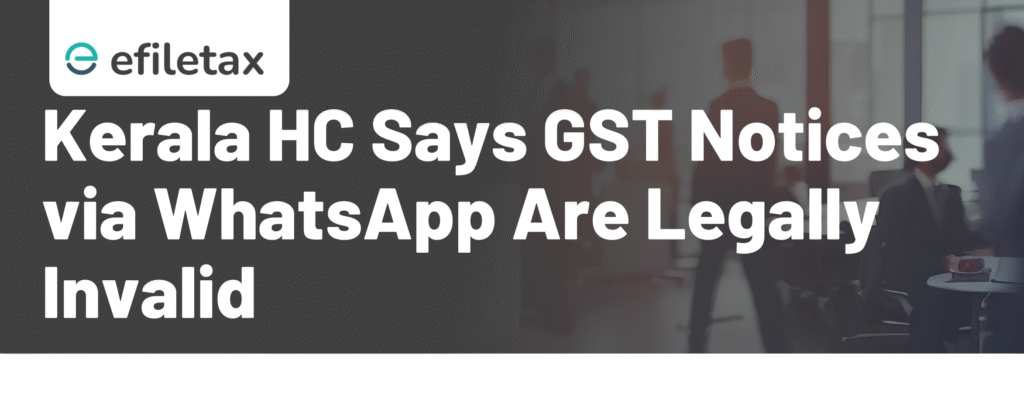
Introduction:
WhatsApp GST notice invalid — this recent Kerala High Court judgment is a major wake-up call for tax officers and taxpayers. This blog breaks down the judgment, its legal basis, and how you can safeguard against invalid notices.
What Was the Case About?
In Kun Motor Company Pvt Ltd v. STO [2024 (76) GSTL 282 (Ker)], the GST officer sent a show cause notice (SCN) to the taxpayer via WhatsApp without following the due process prescribed under Section 169 of the CGST Act, 2017.
The taxpayer didn’t respond—naturally, it wasn’t a legally valid notice. The officer proceeded to pass an ex-parte order and demand tax. The taxpayer challenged the order, and the High Court ruled in their favour.
Legal Provision: Section 169 of CGST Act, 2017
Section 169(1) of the CGST Act lays down specific modes for serving notices:
- By hand delivery or courier
- Registered post or speed post
- Upload on GST portal
- Publication in newspaper (in some cases)
▶️ WhatsApp is not a valid mode.
Kerala High Court’s Observations
- WhatsApp communication is not recognized under CGST Act.
- Just because a message is “seen” doesn’t mean it’s legally served.
- The burden of proof lies with the department to show proper service.
- Natural justice was violated as the taxpayer was denied the chance to respond.
Expert Insight: Why This Matters for You
CA R. Subramanian, tax litigation expert, explains:
“This ruling reiterates that digital convenience cannot override legal procedure. Even if tech is used, it must align with statutory provisions. Otherwise, any demand order based on improper service can be struck down.”
What Should Taxpayers Do?
- Always check your GST portal regularly for official notices
- Notices via WhatsApp or phone messages are not valid — don’t panic
- If served improperly, you can legally challenge the order
- Keep evidence (like lack of email or portal notice) when contesting
Comparison Table: Valid vs. Invalid Notice Service
| Mode of Service | Valid Under CGST? | Notes |
|---|---|---|
| GST Portal Upload | ✅ Yes | Primary method |
| Email (registered) | ✅ Yes | Must be to official email |
| Registered/Speed Post | ✅ Yes | Trackable, physical record |
| WhatsApp Message | ❌ No | Not prescribed |
| Verbal Communication | ❌ No | Unenforceable |
Related Legal Reference
- Section 169, CGST Act, 2017
- Rule 142(1A), CGST Rules — covers communication of SCNs
- Case law: Kun Motor Company Pvt Ltd v. STO
- CBIC has not included WhatsApp under any official notification or circular on service of notices
Internal Link
Read more: GST Amnesty Scheme: Final Deadline Extended to 31.08.2025
External Link
Refer official law: CGST Act – Section 169
Summary
A WhatsApp GST notice isn’t valid under Indian tax law. Kerala High Court ruled that notices must be served through legal channels like email, GST portal, or post as per Section 169 of CGST Act. Orders based on informal delivery can be challenged and struck down.
FAQs
Q1. Is a GST notice via WhatsApp legally binding?
No. As per Section 169, WhatsApp is not a valid mode of service under the CGST Act.
Q2. What should I do if I receive a tax demand without proper notice?
You can challenge it before appellate authorities or High Court citing violation of natural justice.
Q3. Can officers still use WhatsApp for quick communication?
They may use it informally, but for official notices, legal channels must be followed.
Closing CTA:
Got a GST notice on WhatsApp or SMS? Don’t act in haste. Let our experts at Efiletax verify its validity and guide you on the next steps.